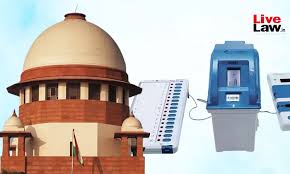NEW DELHI: The Supreme Court will on Friday pronounce its verdict on PILs seeking a 100% cross-verification of votes cast through EVMs with Voter Verifiable Paper Audit Trail (VVPAT) slips.
A Bench of Justice Sanjiv Khanna and Justice Dipankar Datta – which reserved its verdict on the contentious issue on April 18 – had called a senior Election Commission official on April 24 for clarifications on certain aspects of functioning of EVMs and VVPAT.
After interacting with the EC official, the Bench had on Wednesday ruled out going back to the ballot paper system and said it would consider issuing directions to strengthen the EVM system.
Maintaining that it can’t control elections, the Supreme Court had on Wednesday wondered if it can issue an order on petitions seeking a 100% cross-verification of votes cast using EVMs with VVPAT merely on the basis of suspicion.
“Can we issue a mandamus on the basis of suspicion? The report you are relying on says that there is no incident of hacking yet. We are not the controlling authority of another constitutional authority (Election Commission. We can’t control the elections,” the Bench had said.
VVPAT is an independent vote verification system which enables an elector to see whether his vote has been cast correctly. It generates a paper slip which can be viewed by the voter. It is kept in a sealed cover and can be opened in case of a dispute.
The petitioners Association for Democratic Reforms (ADR) and others have demanded a 100 percent count of VVPAT slips as opposed to the current practice of verification of only five randomly-selected EVMs per assembly segment through VVPAT paper slips. They have sought measures to ensure that votes are “recorded as cast” and “counted as recorded”.
They have also sought reversal of the EC’s 2017 decision to replace the transparent glass on VVPAT machines with an opaque glass through which a voter can see the slip only when the light is on for seven seconds.
Virtually rejecting demands to revert to the system of physical counting of votes or to go for a 100 percent count of VVPAT slips, the top court had earlier said it was not practicable in India where the number of voters was very high and physical counting of votes had its own problems.
“We are in our 60s. We have seen what used to happen earlier when there were ballot papers. You may have, but we have not forgotten,” the Bench had told Bhushan after he demanded that the EC should revert to the system of physical counting of votes.
“Everything can’t be suspected. You can’t be critical of everything…please also appreciate if they have done something good. We heard you because we are also concerned,” the Bench had on April 18 told advocate Prashant Bhushan, who represented petitioner ADR.


